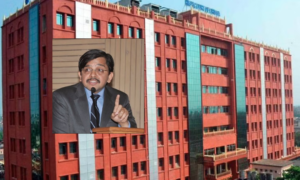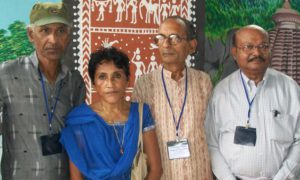Personal tragedies forced her to go against age-old customs and take up the cudgels at a local crematorium. Meet Shanti Behera from Odisha’s Sambalpur
There is nothing extraordinary about the way she looks. Yet Shanti Behera, 52, a resident of Sambalpur, is unique. For the last decade she has been running the local crematorium. According to traditional Hindu customs, women are not even allowed to go the crematorium, leave aside participating in the funeral rites. But compelled to provide two square meals for her family after the demise of her husband, Shanti willingly took on the job of being the full-time keeper at the Kamlibazar Rajghat crematorium.
Married at 15 years, she had just turned 40 when she lost her husband to multiple illnesses. “I had no work and six children, including four daughters, to support. I was thinking of seeking work as a domestic worker but destiny, I guess, had something else in store for me. My husband was the caretaker of this cremation ground. He worked there on a daily wage basis and so when he fell severely ill and was bed ridden, I had to take over his duties or else he wouldn’t have got any money,” Shanti recalls.
“As this is the only crematorium in the area, thousands of households were dependent on it. My husband was the only keeper there and his absence would have posed a huge problem,” she adds.
Her journey from being a housewife to becoming the manager of a crematorium was a difficult one. There were several personal as well as social hurdles. Initially, she found it very difficult to look at the bodies being brought for cremation. She also faced opposition from her relatives and friends because she was daring to go against tradition. But Shanti grew stronger as time passed.
“My husband was cremated at the same ground where he worked. I had to take over just after a few days after his death. It was very painful for me but I went ahead. Then, a few months later, my son died in a road accident. I don’t know how I set the pyre for his funeral. It was a heart breaking moment for me. But ever since, I have learnt to face pain and hardship. I sincerely took to doing the job on a full-time basis, despite being aware that customs dictate that women are strictly prohibited from working at a cremation ground.”
Her job is certainly not for the faint-hearted. Arranging the wood for the pyre, setting it alight, and ensuring that it burns properly — she is always on her toes, come rain or shine, performing her job to the best of her ability. Often she has to work until the wee hours to ensure that everything is done right.
“I work round the clock, and am there whenever the need arises. In fact, I have had to come here at midnight braving terrible storms, too. Over the years, I have realised that this work is not only a means of livelihood but has a higher purpose. I believe I am helping the dead souls rest in peace and that gives me immense satisfaction. The only thing I find difficult is to see a family cremate a child. It reminds me of the worst experience of my life — cremating my own son,” she says.
For the first five years, Shanti worked for free because the municipal authorities did not believe that she would be able to manage the crematorium properly. During that period the family survived on tips, which was insufficient. Later, she started receiving a monthly payment of Rs. 1,500 from the municipality. Managing expenses for the whole month on this meagre salary, however, has only gotten tougher in recent years.
“I have to pay Rs. 600 as rent for the single room where we are staying. I don’t even have a Below Poverty Line (BPL) card so that I can get subsidised rice. I have run from pillar to post to get a BPL card, but to no avail.”
While making ends meet is still a struggle for Shanti, she is glad that at least the community’s attitude towards her has changed. While the local people were once shocked by her bold move, today they respect and admire her courage.
Says local resident Padmabati Behera, “She is a great woman and everybody respects her. She is doing a job that no other woman had dared to do. I have seen her over the years and feel proud of her. She is working selflessly without any expectations.”
Families visiting the cremation ground also draw great comfort from her presence.
Many hope that Shanti’s example will inspire other women to opt for unusual professions. Says Abhida Nanda Mishra, an academic from Sambalpur, “For me, Shanti’s work in the crematorium is not just a livelihood issue but, looked at from a broader prospective, is about women’s empowerment and acceptance in society. It represents positive change.”














